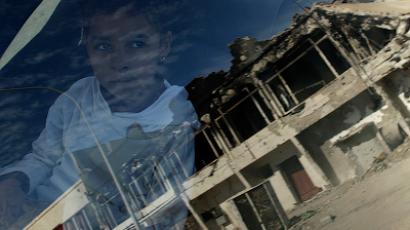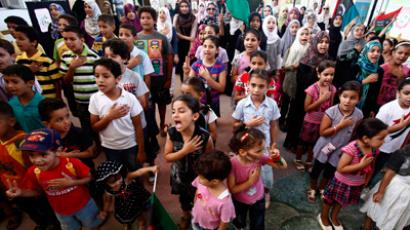Libya: Collapse of justice leaves at least 7,000 behind bars
With their common enemy dead and gone, the uniting factor which bound Libya’s former rebels in their fight against Muammar Gaddafi has melted away. Now, in-fighting among the different armed factions is spilling onto the streets.
Meanwhile, thousands of Libyans remain behind bars waiting for the new rulers to try them for their crime of failing to jump ship.One of the first amnesties of the new Libya was when hundreds of men and women, many of them sub-Saharan immigrants, were released from a makeshift prison. Most of them had spent several months in captivity for the crime of being in the wrong place at the wrong time. While the new authorities were eager to paint the release as a goodwill gesture, both the detention and the parole seemed entirely arbitrary. Some of the dictator's supporters, as these people are alleged to be, were merely employees of government agencies. Others worked as domestic cleaners for government workers. All are now equal before the law, or rather – before the absence of it. The Abu Salim prison was Tripoli's top detention facility under Gaddafi, notorious for mistreatment and arbitrary killings of inmates. While all its prisoners were set free in late August as rebels overran the capital, dozens, possibly even hundreds of makeshift detention centers sprang up around the country. According to the UN, around 7,000 alleged Gaddafi supporters are being held there with little hope of justice or a fair trial. While many in the new Libyan government held positions of power under Gaddafi, those who failed to jump on the bandwagon early enough are now finding themselves stuck behind bars. And that’s a major concern for human rights groups, says Fred Abraham of Human Rights Watch.“Now in Libya there are about 8,000 people in detention and the problem is, they haven’t had any legal review. They have not had access to a lawyer, they haven’t been brought before any independent judicial panel or judges, so that’s what we are calling for now is a quick and prompt legal review and rebuilding of the justice system,” Abraham told RT.The violations are even more brutal outside Tripoli. The town of Tawerga that Gaddafi forces used to launch attacks against Misrata is still a ghost town. Many of its former residents live in refugee camps, and even there, extraordinary renditions by militias are common. One former prisoner who spoke to RT said he was tortured before finally being released. “They beat you until you confess to things you haven’t committed, like entering homes or looting.”More than a month since the capture of Gaddafi’s son Seif al-Islam, Libya's most famous prisoner still doesn't have access to a lawyer. While many doubt he will get a fair trial, Seif al-Islam appears to be much better off than many of his countrymen. At least, thanks to the media spotlight, he will not run the risk of being executed like his father. But many others still do. Mervat Mhani from the Free Generation Movement says the authorities need to do more to help.“Children need their fathers and women need their husbands. The government isn't doing anything to find them. If they are dead we want to know where they are,” says Mhani.It is a cruel dilemma which far too many families are having to confront – to pray for their loved one rotting in a prison, with torture being officially acknowledged, or to hope for their death.














